We recently spoke with Kerry Stackpole, FASAE CAE, CEO & Executive Director, Plumbing Manufacturers International (PMI), about the organization’s advocacy efforts in Washington, D.C. Some really good information is shared here so please take the time to read. MH: What are some of the top plumbing/water legislation/initiatives for which PMI has been advocating over the past few Read more
PMI

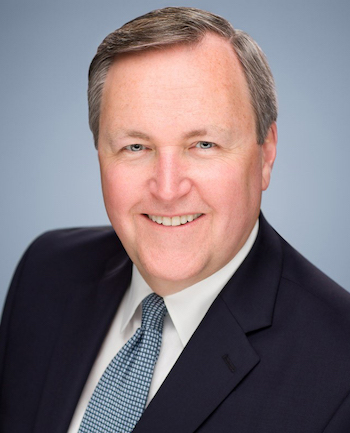 We recently spoke with Kerry Stackpole, FASAE CAE, CEO & Executive Director, Plumbing Manufacturers International (PMI), about the organization’s advocacy efforts in Washington, D.C. Some really good information is shared here so please take the time to read.
We recently spoke with Kerry Stackpole, FASAE CAE, CEO & Executive Director, Plumbing Manufacturers International (PMI), about the organization’s advocacy efforts in Washington, D.C. Some really good information is shared here so please take the time to read.
MH: What are some of the top plumbing/water legislation/initiatives for which PMI has been advocating over the past few months/year?
Stackpole: PMI continues to advance policies that strengthen plumbing manufacturers and the American economy at the federal level. As Congress works to address current issues such as rising inflation, China competition issues and the war in Ukraine, PMI remains actively engaged with lawmakers on the following key priorities:
• Bipartisan Infrastructure Package Contains Much-Needed Funding for Water Infrastructure Projects – PMI remains a strong supporter of the bipartisan Infrastructure Investment and Jobs Act that Congress passed, and President Biden signed into law in November 2021 to address decades of underinvestment in the nation’s infrastructure system. Alongside major investments in transportation, electric vehicles, internet, and roads, the legislation earmarks $55 billion for clean water and water infrastructure projects. It represents some of the most significant investments from the federal government in the water sector in decades.
— Much of the funding will be coming through the Clean Water State Revolving Fund (CWSRF) and the Drinking Water State Revolving Fund (DWSRF). These programs are federal-state partnerships that provide communities with low-cost financing for water infrastructure projects and each program will receive $11.7 billion over five years. A good portion of the funding being distributed come from the state revolving funds. Each state will have a priority list of projects up for SRF funding
— It is estimated that there are between 6 million to 10 million lead service lines in the United States. Much of the drinking water infrastructure in older U.S. cities was built before 1950. The new infrastructure law also includes $15 billion to support lead removal projects, with $3 billion being distributed to states and cities in 2022. Forty- nine percent of the state revolving funds must be provided to disadvantaged communities. PMI strongly supported this funding, and not placing matching or cost-share requirements on the states or local governments. Money can go toward direct removal of lead pipes, as well as efforts like identification of lead pipes, as well as the planning and design of new projects.
— While this funding is a good start, industry experts estimate the actual cost of fully replacing all lead pipes in the U.S. could be $60 billion. Additional investments will be needed from the federal government and state authorities.
— PMI also supports full funding for the Water Infrastructure Improvements for the Nation (WIIN) Act. Within WIIN funding is the Voluntary Lead Testing in Schools and Child Care Drinking Water grant program for states, territories, and tribes to test for lead in schools and childcare facilities.

• Get the Lead Out of Assisted Housing Act (S. 4047) – This bill recently introduced in the Senate directs the Department of Housing and Urban Development (HUD) to update its standards to include inspecting for lead in service lines and lead in plumbing, creates a Healthy Homes Lead in Drinking Water Grant Pilot Program to provide grants to states and local governments to be used to create a lead service line inventory, testing for lead in the drinking water at childcare centers and schools, and testing for lead at public facilities like public water fountains and remediation. In addition, it requires notification of tenants of the level of lead in drinking water found and must offer interim controls, such as the installation of water filters known to remove lead.
• Addressing Disruptions in Domestic and Global Supply Chains – Port congestion, the truck driver shortage and COVID-19 related disruptions are just a few of the challenges plumbing manufacturers are facing in producing and getting products to their customers.
— Congress is on the verge of passing the Ocean Shipping Reform Act of 2022 (H.R. 4996/S.3580), which was recently approved by both chambers (multiple times in the House) and part of the competition legislation which is part of a House-Senate conference. The legislation is aimed at decreasing ocean transportation costs, reducing shipping delays, and decreasing shipping delays through the improvement of shipping standards, and implementation of better oversight mechanisms. PMI is meeting with lawmakers and staff urging passage of the measure and participates in the Ocean Shipping Reform Coalition.
— Another key piece of legislation that PMI supports and actively engaged on is the DRIVE-Safe Act, which would allow younger truck drivers to participate in interstate commerce after completing thorough training. Passing this legislation would help alleviate both current and future trucking shortages.
• Advocating for Policies that Strengthen Manufacturing Competitiveness – As members of the House and Senate enter a conference process to reconcile differences between the House- passed America COMPETES Act of 2022 (H.R. 4521) and the Senate-passed United States Innovation and Competition Act (USICA) (S. 1260) PMI is urging conferees to include these key provisions in a final competition bill:
— Enhancing Research and Cybersecurity Initiatives – PMI is urging conferees to include the National Institute of Standards and Technology (NIST) for the Future Act. It is included in the America COMPETES Act. The bill reauthorizes NIST for five years. It establishes innovative programs to support U.S. global competitiveness and makes crucial investments including funding for the Manufacturing Extension Partnership, cybersecurity vulnerability research initiatives, and premise plumbing research to promote new and innovative technologies that can improve the safety and water efficiency of our plumbing systems in buildings, hospitals, and homes. PMI, its members, and key stakeholder were successful in including the NIST Plumbing Research Act into the NIST for the Future Act, which would re- establish a federal laboratory to conduct research of premise plumbing and to promote new and innovative technologies that can improve the safety, water efficiency and reliability of our plumbing systems. NIST is a critical agency that supports U.S. competitiveness through precision measurement research, partnership with industry, facilitating and developing standards, and support for U.S. manufacturing.
— Increasing Supply Chain Resilience – PMI supports the creation of the Manufacturing Security and Resilience Program and the $45 billion investment to support supply chain resilience included in the America COMPETES act.
— Lift Tariffs and at a Minimum Establish a Broad Section 301 Tariff Exclusion Process – PMI supports provisions to immediately reinstate a comprehensive, fair, and transparent exclusion process that will give manufacturers in the United States a strong voice on China Section 301 tariff relief on a case-by-case basis as included in USICA. While the best solution would be to lift the tariffs and take a more strategic approach to address China’s unfair trade practices, we believe reinstituting this exclusion process is a critical interim step to providing relief to U.S. businesses. PMI continues to call for the elimination of the China Section 301 tariffs. The tariffs in place since 2018 and 2019 are essentially a tax paid by U.S. businesses and consumers.
– PMI testified before the International Trade Commission (ITC) and supplied testimony in opposition to dozens of tariffs on a variety of plumbing fixtures and fittings. Since 2018, PMI has actively participated with nearly 200 trade associations, as part of the Americans for Free Trade coalition and advocated on this issue.
— Ensuring the Tax Code Continues to Support Innovation – The U.S. tax code has allowed companies since 1954 to immediately deduct 100% of their R&D expenses in the year in which they are incurred. However, starting this year, companies must amortize or deduct their R&D expenses over a period of years, which makes R&D more expensive to undertake. This harmful change in the tax treatment of R&D expenses comes at a time of increasingly fierce global competition for research dollars. Due to this tax change, the U.S. is now just one of two developed countries with an amortization requirement (the other one is Belgium). While not included in the base text of the competition legislation, a bipartisan group of 28 senators and 102 House members have signed on to legislation to address this change to R&D policy, and a Senate motion to instruct conferees on this issue was adopted in a 90–5 vote. Failing to reverse the amortization provision will hurt U.S. R&D jobs, innovation, and competitiveness, which is why PMI supports a final bill that addresses this harmful tax change.
• Fighting Retail Crime and Counterfeiting – The rise in organized retail crime over the past two years is a troubling development. Retailers, including home improvement stores, report losing over $700,000 per $1 billion in annual sales volume due to this organized theft activity. Counterfeiting, particularly from China, hits manufacturers of all shapes and sizes.
— PMI strongly supports the INFORM Consumers Act legislation currently pending and part of the America COMPETES Act (noted above). The bipartisan bill modernizes the nation’s consumer protection laws, with a particular focus on addressing the sale of counterfeit and stolen merchandise on e-commerce platforms. It would require online marketplaces to verify the identity of high-volume third-party sellers to make it more difficult to fence stolen merchandise online and also address the sale of counterfeit goods.
• SEC Climate Rule – 2022 will be an important year for Environment, Sustainability and Governance (ESG) regulatory activity. Investors, customers, and the public demand to know more about companies’ environmental policies. They may soon get that additional transparency with a new proposed Securities and Exchange Commission (SEC) rule mandating public companies track and report carbon emissions and climate-related risks throughout their entire supply chains.
PMI members have been making solid progress in their sustainability efforts. They have long been leaders on climate solutions. Many also regularly provide climate-related information to their investors, including via corporate sustainability reports, third-party reporting frameworks and SEC filings.
In the meantime, we’re keeping a close eye on the proposed SEC rule. It’s anticipated that some companies and trade groups will challenge the rule saying it goes too far. These new SEC requirements, if adopted, would at the earliest take effect in fiscal year 2023 and begin to apply to SEC filings in 2024. SEC is accepting comments on the proposed rule.
MH: Why does PMI feel that these are the worth the fight?
Stackpole: America’s economic engine drives global economies and enables plumbing manufacturers to deliver rapid innovations in high performing, quality engineered, and safe fixtures and fittings. PMI’s advocacy efforts work to level the playing field for our members to assure they can be successful in designing and delivering products that exceed the needs and expectations of commercial and residential customers. It’s about delivering member value every day.
MH: To what extent is PMI’s involvement on the Hill?
Stackpole: One of the strengths that draws manufacturers to PMI is our well-respected reputation and proactive engagement with Congressional staffs, elected leaders, and regulatory policymakers on the Hill and in state capitals around the country. PMI members benefit immensely from the daily presence of our Federal lobbyist doing the important work of gathering legislative insights, advancing our positions, sharing ideas with our allies in Congress, and support for the efforts of other plumbing industry groups. PMI’s proximity and strong relationships on Capitol Hill help us deliver results for PMI members. We can readily reach out to those who make things happen on the Hill, demonstrate our persistence and work toward meaningful and valuable outcomes. Said differently, we get results.
MH: I’m sure it can get deflating at times advocating something to Big Government, and it even may take months or even years of work, but how do you (PMI) remain positive in its approach?
Stackpole: PMI embraces the art of the long view. Our advocacy goals – both short and long term – demand we stay focused on the desired outcomes. When you realize that achieving those outcomes will change people’s lives for the better, you simply cannot afford to be deflated by the process. I think it was Steve Jobs co-founder of Apple who said, keep your eye on the prize and rest will take care of itself. I could not agree more.
MH: Can you describe the feeling of being a part of a successful initiative?
Stackpole: There’s an enormous sense of satisfaction and joy in achieving something important for our members, their employees, and for the communities in which we all work and live. One example, PMI and its industry allies have for years encouraged federal lawmakers to formally authorize EPA’s successful WaterSense program and to take steps to rebuild and revitalize the nation’s water infrastructure. PMI was successful with the passage of the America’s Water Infrastructure Act (AWIA) signed into law by the President in October 2018. PMI met with the staff of dozens of congressional members and wrote a gazillion letters underscoring the importance of the WaterSense authorization. Knowing you’ve made a difference that will improve your fellow citizen’s access to clean water, and safe, responsible plumbing, is personally very satisfying and rewarding.

San Antonio — The seventh Emerging Water Technology Symposium returned as an in-person event for the first time in four years, bringing together industry, manufacturing, water utility and government leaders from around the world. A focus of this year’s event was on resources communities require to build safe and resilient plumbing systems as well as Read more
San Antonio — The seventh Emerging Water Technology Symposium returned as an in-person event for the first time in four years, bringing together industry, manufacturing, water utility and government leaders from around the world. A focus of this year’s event was on resources communities require to build safe and resilient plumbing systems as well as meet the growing list of challenges to America’s drinking water.
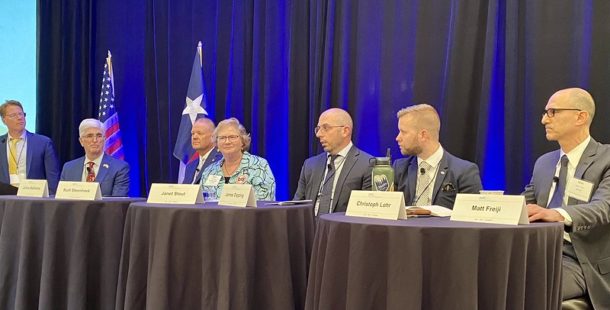
The esteemed panel on Effective Risk Management of Building Water Systems for Pathogen Control included (from l to r) Julius Ballanco, president, JB Engineering; Kurt Steenhoek, International Representative, UA; Janet Stout, Executive VP and Founder, Special Pathogen Laboratory; James Dipping, Director of Plumbing Engineering, Environmental Systems Design, Inc.; Christoph Lohr, VP of Strategic Initiatives, IAPMO; and Matt Freije, CEO, HC Info.
The May 10-11 event at the Westin Riverwalk, San Antonio was co-convened by the Alliance for Water Efficiency (AWE), the American Society of Plumbing Engineers (ASPE), the International Association of Plumbing and Mechanical Officials (IAPMO) and Plumbing Manufacturers International (PMI).
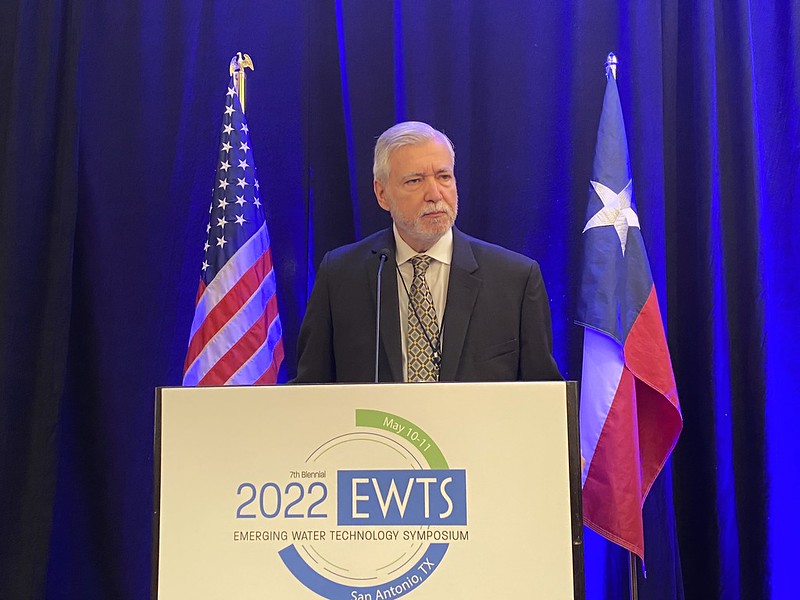
Pete DeMarco
“As an industry we have a number of high priority research needs that relate to water quality as well as water and energy efficiency,” IAPMO Executive Vice President of Advocacy and Research Pete DeMarco explained in discussing the importance of the symposium. “This year’s event brought together some of the brightest minds industry has to offer all focused on how we make our plumbing and mechanical systems safer and more resilient to meet the challenges ahead.”
In his opening remarks, DeMarco pointed to a number of accomplishments for which the EWTS has served as a springboard, including the development of the Green Plumbing and Mechanical Code Supplement (now the Water Efficiency and Sanitation Standard WE•Stand); ANSI/ASHRAE Standard 188-2018, Legionellosis: Risk Management for Building Water Systems; ASSE 12000 series on infection control and water quality, which is in IAPMO’s Uniform Plumbing Code (UPC®); and IAPMO’s Water Demand Calculator, whose second version was released in 2020.
“This symposium provides a much-needed platform for stakeholders across the industry to gather, discuss the latest research, and then discuss how we can take action,” he said. “It is a highly valuable event, and I look forward to seeing it continue to grow in the future.”
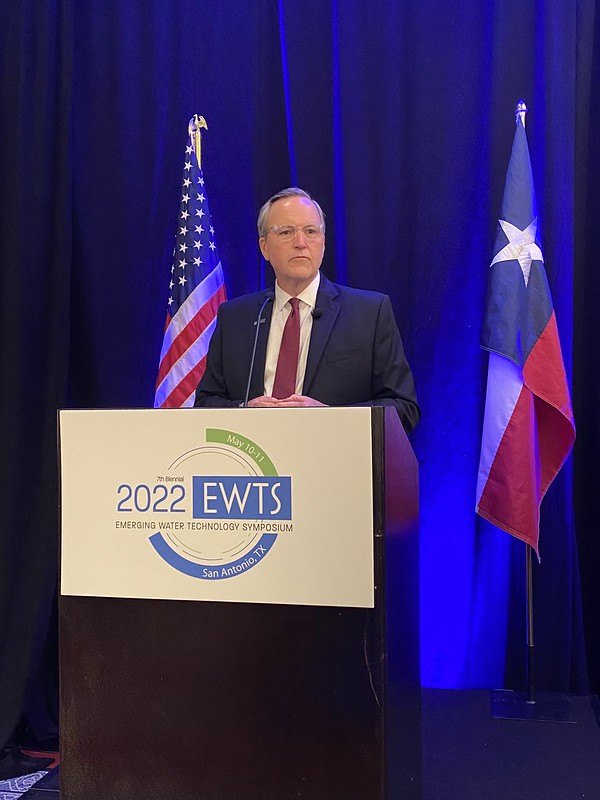
Kerry Stackpole
PMI CEO Kerry Stackpole spoke at the event and said the relationships between the organizations represented at EWTS had likely never been more important than they are now. He said that while the best and brightest among us devised medical solutions to the COVID-19 pandemic, the plumbing industry also played an important role.
“What’s also important is how our industry responded,” he said. “Our industry’s experience and our focus became touchless faucets, antimicrobial surfaces, water purification systems, all kinds of energy-efficient devices focused on safe and responsible plumbing. We all had a contribution to make and I think our industry stepped up.”
Stackpole said wildfires, flooding and drought that different regions of the United States are experiencing put those in the industry in a position to shape the future.
“Your active engagement here, in your communities back home, and in the marketplace of ideas, where we will have opportunities to share ideas with one another, will make all the difference,” he said. “You actually are able to turn the dial on this, and I think that’s really exciting.”
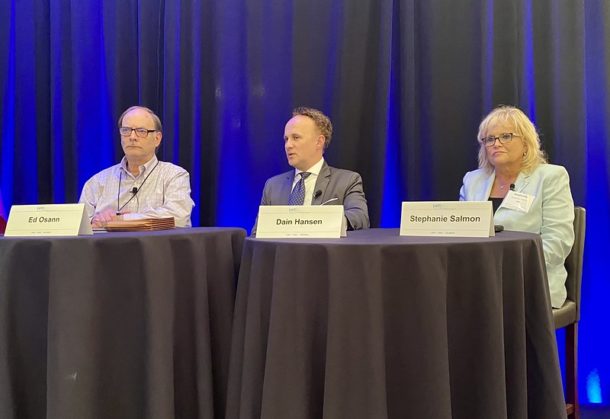
A day 2 panel saw (from l to r) Ed Osann, Senior Water Policy Analyst, NRDC; Dain Hansen, Executive Vice President, Government Relations, IAPMO; and Stephanie Salmon, Washington Representative, PMI, talk about the implications of the Infrastructure Investment and Jobs Act on Drinking Water and Wastewater.
This year’s keynote speakers were Robert Puente, president and CEO of the San Antonio Water System (SAWS), and Don Johnston, senior operations director, Indonesia, for Water.org.
Puente’s presentation looked at three ways in which SAWS, which serves 2 million customers over four counties, uses innovation to deliver water to its customers: advanced metering deployment, “smart” manhole covers, and conservation.
“It’s all about innovation,” he said. “And I think if you talk to our employees, although they will tell you that it’s their idea, we know that they got their idea from coming to events like this. Every good idea, you should expect it to be stolen, to be used by someone else, and you should be flattered by that. I think anything that you look at here started somewhere else, and we went to conferences in other cities and were able to bring back the ideas to SAWS to really get the innovation aspect in this.”
In delivering his keynote address remotely from Jakarta, Indonesia, Johnston spoke about the global water and sanitation crisis’s impact on low-income households — one in nine people lack access to safe water, one in three do not have access to a toilet — and some potential solutions. Working with financial institutions and water utilities, as well as sister company WaterEquity, Water.org helps bring affordable financing to people in need of water.
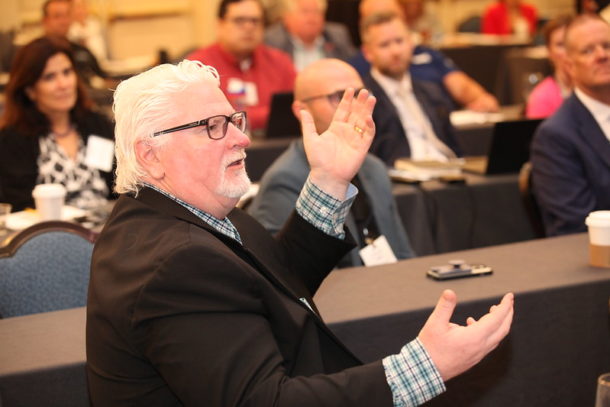
The Hub’s John Mesenbrink asks the hard-hitting questions during the symposium.
“In about 19 years of work on the ground, we’ve seen water and sanitation access reach more than 45 million people through more 10 million microloans disbursed to households with capital of $3.7 billion mobilized,” he said.
In his presentation, Phillip White, manager of plumbing and mechanical inspections for the city of Vancouver, British Columbia, shared how his city addressed the problem of insufficient sewer capacity when it came to capturing large amounts of rainfall through water reuse technologies. One development, the Oakridge Centre, utilized the IAPMO Water Demand Calculator and is expected to have the largest non-potable water system in North America.
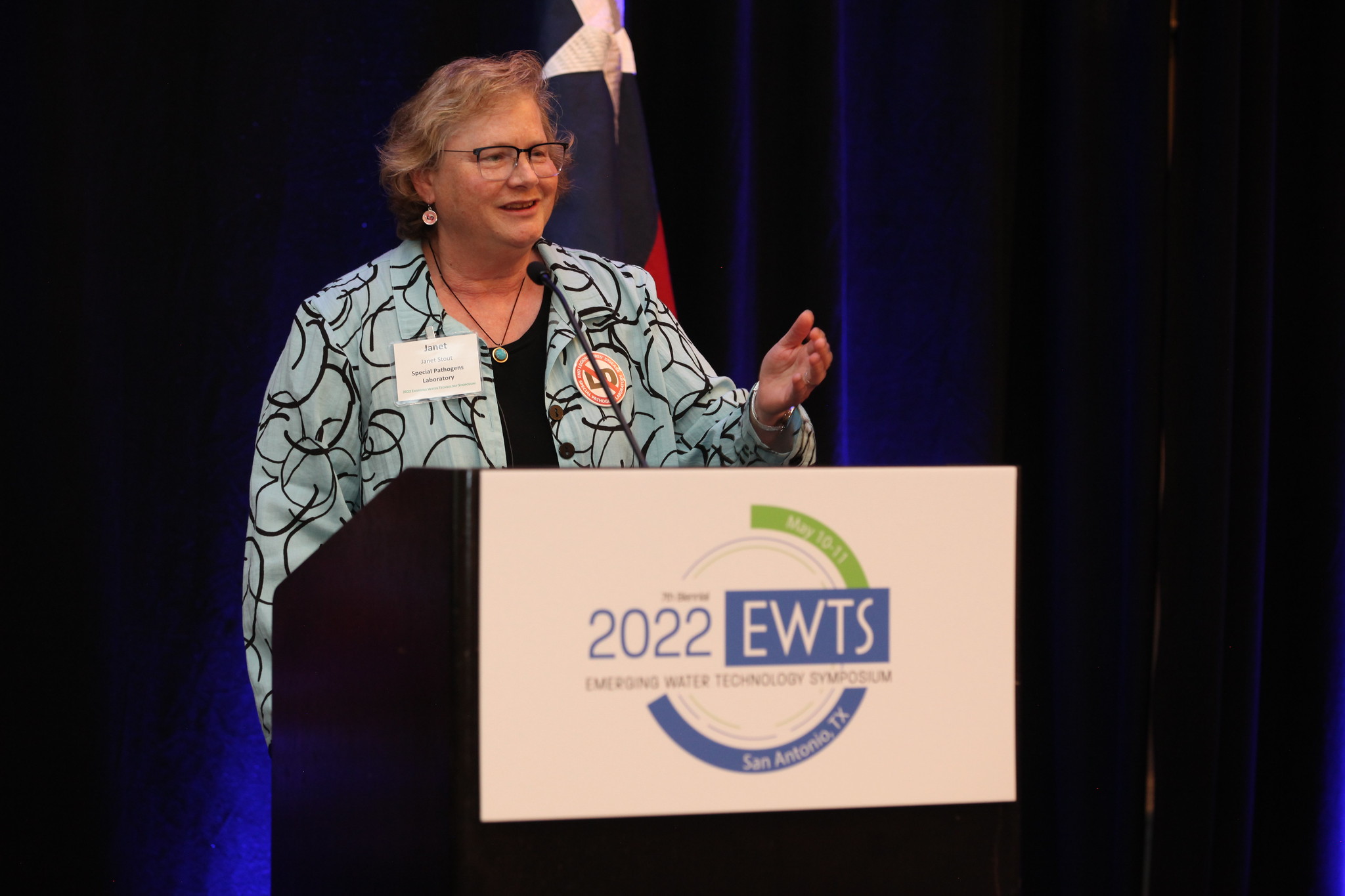
Janet Stout
Another speaker, Special Pathogens Laboratory Executive Vice President/Founder Dr. Janet Stout, looked at approaches and products for mitigating the risk of Legionellosis in point-of-use and point-of-entry building water systems. Improved water management requires knowledgeable Legionella prevention and water service providers, which can come from certification to ASSE/IAPMO/ANSI 12080 for Legionella Water Safety and Management Personnel.
IAPMO will provide sessions from the EWTS on-demand in the near future. To be notified when they are available, register at www.ewts.org/2022-ewts.

Plumbing Manufacturers International announced today the promotion of Jodi Stuhrberg from association manager to the newly created role of director of programs and administration. “We’re grateful for Jodi’s outstanding dedication to PMI and our members as well as her commitment to creating thoughtful, unique programs and services. We congratulate Jodi on her well-deserved promotion and look Read more
Plumbing Manufacturers International announced today the promotion of Jodi Stuhrberg from association manager to the newly created role of director of programs and administration.
“We’re grateful for Jodi’s outstanding dedication to PMI and our members as well as her commitment to creating thoughtful, unique programs and services. We congratulate Jodi on her well-deserved promotion and look forward to seeing her continued success in this new role,” said PMI CEO/Executive Director Kerry Stackpole.

A resident of Palatine, Illinois, Stuhrberg said her success at PMI stems from a strong desire to support others, build great relationships, and lead by example. “It helps to be part of a wonderful team that has encouraged and supported me along the way,” she added.
The recipient of the PMI President’s Award in 2018, Stuhrberg began her career at PMI in December 2013 as association coordinator and quickly earned a promotion to association manager. Since then, she has expanded her responsibilities beyond providing administrative support to PMI committees, managing event details, and fielding inquiries from existing and prospective members. Stuhrberg began developing and managing more events and taking on increasingly more challenging duties.
Because her work touches every part of the association, she lightheartedly describes her role as “plate spinner.” Among her many responsibilities, Stuhrberg provides oversight and support for developing new programs and services – such as the PMI Aspiring Leaders Program and PMI CEO Thinking Forum; reinforcing advancement of diversity, equity and inclusion within association activities; and managing staff, member inquiries and much of the day-to-day operations. She also supports all PMI committees and PMI Board of Directors’ functions and oversees all aspects of the annual PMI Manufacturing Success Conference.
“I’m proud of how we’ve evolved our annual conference to include more progressive educational content and speakers and to host the conference in inspiring cities and venues. I’m looking forward to continuing to bring innovation to our programs to keep them fresh and exciting for our members,” Stuhrberg said.
About Plumbing Manufacturers International
Plumbing Manufacturers International (PMI) is the trade association of plumbing product manufacturers that produce more than 90% of the United States’ plumbing products, represent more than 150 iconic brands, and develop safe, reliable and innovative water-efficient plumbing technologies. PMI members contribute more than 464,000 jobs and $85.5 billion in economic impact to America’s economy.
With a vision of safe, responsible plumbing – always, PMI advocates for plumbing product performance contributing to water efficiency and savings, sustainability, public health and safety, and consumer satisfaction. PMI members manufacture water-efficient toilets, urinals, faucets, showerheads and other products at more than 70 locations across the country and market them online and in more than 24,000 home improvement stores, hardware stores and showrooms in all 50 states. For more information on PMI, contact the organization at 1750 Tysons Blvd., Ste. 1500, McLean, Va., 22102; tel.: 847-481-5500. www.safeplumbing.org.
Washington — The IAPMO Group and Plumbing Manufacturers International (PMI) applaud the House Science, Space and Technology Committee for advancing legislation this past week reauthorizing the National Institute of Standards and Technology and calling for the creation of a program for premise plumbing research. During the July 27 committee mark-up of the bill, U.S. Rep Read more
Washington — The IAPMO Group and Plumbing Manufacturers International (PMI) applaud the House Science, Space and Technology Committee for advancing legislation this past week reauthorizing the National Institute of Standards and Technology and calling for the creation of a program for premise plumbing research.
During the July 27 committee mark-up of the bill, U.S. Rep. Paul Tonko (D-N.Y.) was successful in offering an important amendment to H.R. 4609, the National Institute of Standards and Technology for the Future Act of 2021, that would authorize funding at NIST to conduct practical, water-related research on systems within homes and buildings, addressing critical issues such as water quality, efficiency, reuse, sustainability and resilience.
A new program at NIST will help to combat a 900% increase in Legionnaires’ disease since 2000. Legionnaires’ disease is an infection caused by the bacteria Legionella. Symptoms of the disease include fever, cough and pneumonia, while a milder infection can look like a flu-like illness without pneumonia. The sickness can be deadly in older patients or those with other risk factors. Reports of the infection are more common in the summer and early fall when warming, stagnant waters present the best environment for bacterial growth in water systems. News articles from across the country detail the prevalence of this public health challenge.
From the exponential growth of Legionnaires’ disease outbreaks to increasing housing affordability, the industry is waiting and ready to apply the findings of this research to tackle major issues,” said IAPMO CEO Dave Viola. “We applaud Rep. Tonko and other committee members for recognizing this need and including it in this important piece of legislation. This will have a direct, positive impact on America’s homes and buildings today and for the foreseeable future.”
Over the years, IAPMO and PMI have worked with Congress and NIST to address and prioritize research needs on plumbing. Rep. Tonko’s amendment is based on legislation developed by Rep. Matt Cartwright (D-PA) and Sen. Tammy Duckworth (D-IL), who have both previously introduced legislation to expand NIST’s efforts on drinking water. In May 2020, NIST published a report that identified nearly 60 specific research needs and challenges faced by the plumbing industry. This report provides a useful roadmap for addressing those needs through applied research and codes and standards activities.
Kerry Stackpole, PMI CEO, said that “American consumers have the benefit of state-of-the-art water efficient plumbing fittings and fixtures; however, the legacy plumbing that carries water to these fixtures in our homes and offices are based on research and data from the 1930s.” Stackpole noted that “updated research and data by NIST, in conjunction with academia, industry and other key stakeholders, would significantly improve the water efficiency and safety in water systems across the nation.”
Another important issue that will be addressed by NIST research is the sizing of plumbing systems in buildings. Much has changed in the way Americans use water since the 1920s and ’30s when Dr. Roy Hunter, working for the National Bureau of Standards, the predecessor to NIST, developed the method for predicting water use demands in a building and determining how large systems need to be to accommodate those demands. While minor updates have been made over the years to these methods, they are still used today in plumbing codes despite the many improvements and efficiencies made to plumbing fixtures, appliances and other water-using equipment in subsequent years. As a result, it is widely recognized that today’s plumbing systems are often grossly oversized, resulting in increased building costs, wasted water and energy, and declining water quality. The research will seek to resolve this problem and lead to a method for determining plumbing system sizes that are more appropriate for the particular building.
McLean, Va. — Plumbing Manufacturers International today welcomed the news of the bipartisan agreement between the Trump administration and Congress that sets a path forward on the U.S.-Mexico-Canada Agreement with the support of Mexico and Canada. “PMI members were pleased to learn about this important step toward a ratified United States-Mexico-Canada Agreement,” said PMI CEO/Executive Director Kerry Stackpole. “The Read more
McLean, Va. — Plumbing Manufacturers International today welcomed the news of the bipartisan agreement between the Trump administration and Congress that sets a path forward on the U.S.-Mexico-Canada Agreement with the support of Mexico and Canada.
“PMI members were pleased to learn about this important step toward a ratified United States-Mexico-Canada Agreement,” said PMI CEO/Executive Director Kerry Stackpole. “The plumbing manufacturing industry prospers upon free trade between these three great North American nations, and reaching this milestone brings confidence to our members as we enter 2020.”
PMI will continue to monitor the process and supports the approval of the USMCA in the weeks ahead. “We especially thank United States Trade Representative Robert Lighthizer, members of the Trump administration, and a number of members of Congress who listened to the concerns of manufacturers and contributed to this important agreement,” Stackpole added.
U.S. manufacturers are the largest exporter of plumbing products into Canada’s and Mexico’s marketplaces. The U.S. plumbing products comprised 41 percent of Canada’s import market, and 54 percent of the Mexican import market, according to the latest U.S. Department of Commerce International Trade Administration’s Building Products and Sustainable Construction Top Markets Report.
